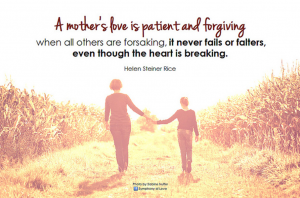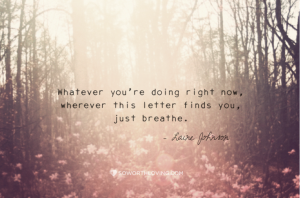Letter #1
 Watching my daughter battle with an eating disorder has been the most painful experience of my life. Seeing the life drain from her eyes and body; losing the happy, confident, warm person I once knew; and facing her imminent death numerous times, is beyond a parent’s worst nightmare and left me feeling incredibly helpless. But the depth of illness and the recovery journey isn’t a battle she faces alone…it changes everything…you are both on a new journey, in unchartered waters. I want to reinforce for you, thatyou haven’t caused the eating disorder and you can’t stop it or force recovery, you can only be there to support her and have faith and hope for her future. I want to share with you some of the things I have learnt along the way:
Watching my daughter battle with an eating disorder has been the most painful experience of my life. Seeing the life drain from her eyes and body; losing the happy, confident, warm person I once knew; and facing her imminent death numerous times, is beyond a parent’s worst nightmare and left me feeling incredibly helpless. But the depth of illness and the recovery journey isn’t a battle she faces alone…it changes everything…you are both on a new journey, in unchartered waters. I want to reinforce for you, thatyou haven’t caused the eating disorder and you can’t stop it or force recovery, you can only be there to support her and have faith and hope for her future. I want to share with you some of the things I have learnt along the way:
- You will be given conflicting advice which can be frustrating and confusing. I suggest obtaining information from several different sources, then sitting down with your loved one and discussing what is and isn’t beneficial for them. They are the experts on their eating disorder. Maintain honest and open communication.
- If you don’t know what to say, don’t say anything.
- I struggled with intense feelings of helplessness, grief and loss, but by asking my daughter what I CAN do to support her, even if it is seemingly small, I felt somewhat more useful.
- It is often frustrating and disheartening when you feel that there is little practical support you can provide, but I found it helped both me and my daughter when I found other little ways to express my commitment, such as in sending her encouragement cards and finding treats that didn’t involve food.
- Don’t let the eating disorder become your whole world. Try to enjoy time together by watching a movie, playing a game, or doing something you both enjoy.
- If you’re going out together, try to ensure the outing doesn’t revolve around a meal as it’s too stressful for all involved.
- Try not to get too hung up on things you don’t understand or words such as ‘journaling’, ‘processing’, and ‘ambivalence’. Eating disorders and recovery are hard to understand and the best thing you can provide is time and a listening ear.
- Use caution and wisdom in who you choose as your close support network and how much information you share with other family members. Many have unconstructive ideas and concepts of what an eating disorder and recovery look like. Confide in those who are open to learning and understanding.
- The eating disorder is not your daughter and your daughter is not the eating disorder. It is like living with two different people. Who they truly are is still within them, just hidden away while they are in eating disorder mode. It is exhausting for them to just try and live in normal society, so it is important that they get their personal space and rest to ease their strain and pressure.
- If you are living in the same house or close proximity, you need to be able to step back from it at times; not become totally consumed by it; have a life outside of the eating disorder; and make time to relax and recharge.
- Ensure you have your own supports…you need them, including medical support. In the depths of my daughter’s eating disorder, my own physical and mental health, blood pressure, etc were deeply affected due to the stress and pressure. My doctor was a great source of support and understanding whilst monitoring the effects on my own health.
- It’s difficult to get your head around, but recovery isn’t just about eating again…it’s about the battle that goes on internally.
- Love unconditionally.
 When I began to see evidence of my daughter ‘returning’ to me, it brought an inexplicable joy. I cherish the moments where I began to see her have energy to interact and play with her nieces and nephews; when the spark returned to her eye; when she once again became animated in conversation; when she began to make decisions, say ‘no’ and demonstrate a strength I’d never seen; when she wanted to spend more time with family, friends, and her partner; when she began to talk more positively and dream about the future, marriage and relationship commitments; and when she began participating in things she once loved.Never ever give up hope. It is a journey of a few steps forward, one step backwards. Concentrate on the forward steps.
When I began to see evidence of my daughter ‘returning’ to me, it brought an inexplicable joy. I cherish the moments where I began to see her have energy to interact and play with her nieces and nephews; when the spark returned to her eye; when she once again became animated in conversation; when she began to make decisions, say ‘no’ and demonstrate a strength I’d never seen; when she wanted to spend more time with family, friends, and her partner; when she began to talk more positively and dream about the future, marriage and relationship commitments; and when she began participating in things she once loved.Never ever give up hope. It is a journey of a few steps forward, one step backwards. Concentrate on the forward steps.
Letter #2
 I thought we could deal with this eating disorder on our own – that if I could talk her into eating more the disorder would ‘go away’. If an eating disorder is suspected it is much better to seek treatment AS SOON AS POSSIBLE to prevent further damageand before the habits of disordered eating, behaviour and thinking become even more entrenched. I didn’t actually realise how serious things were until she was diagnosed. Recovery is a team effort – you must have a specialist medical team (GP, dietitian, psychiatrist at least), a co-operative patient and a family or at least one significant person to provide unconditional love, with a willingness to NEVER GIVE UP, support in the recovery process.
I thought we could deal with this eating disorder on our own – that if I could talk her into eating more the disorder would ‘go away’. If an eating disorder is suspected it is much better to seek treatment AS SOON AS POSSIBLE to prevent further damageand before the habits of disordered eating, behaviour and thinking become even more entrenched. I didn’t actually realise how serious things were until she was diagnosed. Recovery is a team effort – you must have a specialist medical team (GP, dietitian, psychiatrist at least), a co-operative patient and a family or at least one significant person to provide unconditional love, with a willingness to NEVER GIVE UP, support in the recovery process.
For me this includes preparing meals; nursing my daughter back to health through the inevitable illnesses that occur due to a weakened immune system and therefore a susceptibility to everything and anything that is going around until her immune system is strengthened through adequate nutrition and rest; lots of hugs and smiles; lots of encouragement; a listening ear; and being vigilant to ensure bad habits are not returning, but also being a ‘cheer squad’ for celebrating successes such as the return of menstruation. It is very intense for all concerned.
The first thing I would recommend to do is to contact the Eating Disorders Association for general information and for names of medical specialists in eating disorders listed by location. I have learned that most doctors, including those that staff the emergency rooms of hospitals, do not understand how eating disorders work and exactly what is needed to help, but with the help of our specialist medical team, they have held our hand, both my daughter’s and mine, and through their enormous experience, knowledge, conviction and compassion have led us out of this unknown territory of darkness and illness into a more stable functioning world of health.
Good nutrition is key before any emotional factors can be addressed. We must continue to have full trust in their guidance and advice as they continue to educate us in this on-going battle through the recovery process.